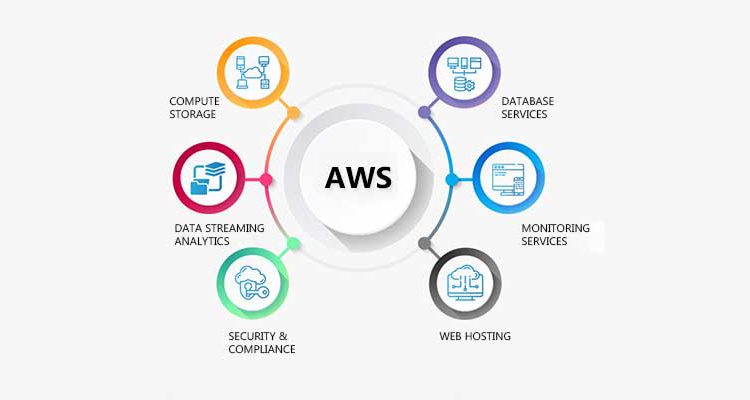Transforming Business Operations with Amazon Web Services (AWS)
AWS revolutionizes business operations with scalable, cost-effective cloud solutions. Innovate, improve efficiency, and enhance customer experiences with expert guidance and robust security.


Introduction
AWS revolutionizes business operations with scalable, cost-effective cloud solutions. Innovate, improve efficiency, and enhance customer experiences with expert guidance and robust security.
Today, businesses are always looking to improve, grow efficiently, and stay ahead. Cloud computing is crucial for achieving these goals, offering flexible, scalable, and affordable solutions. Amazon Web Services (AWS) is a top choice among cloud providers, offering a wide range of services that suit businesses of any size and industry. This article states that how AWS can change how businesses operate, covering its services, advantages, and practical uses.
Understanding AWS
Amazon Web Services (AWS) is Amazon's company that provides on-demand cloud computing platforms and APIs to consumers, businesses, and governments. With data centers all around the world, AWS offers a dependable, scalable, and low-cost computing platform "in the cloud."
Key AWS Services
AWS offers a multitude of services that can be categorized broadly into computing, storage, database, networking, security, and other specialized services. Some of the most popular and commonly utilized AWS services are:
AWS EC2 (Elastic Compute Cloud): Our cloud services offer flexible computing power. Businesses can quickly set up virtual servers whenever they need them.
AWS S3 (Simple Storage Service): Our storage solutions are strong and can handle lots of data for backups, archives, and big data analysis.
AWS RDS (Relational Database Service): This makes it easier than ever to create, run, and expand databases in the cloud.
AWS Lambda: Allows businesses to run code without provisioning or managing servers, ideal for building event-driven architectures.
AWS VPC (Virtual Private Cloud): Helps businesses create a secure virtual network for launching AWS resources.
Benefits of AWS for Business Operations
Scalability and Flexibility:
AWS enables organizations to scale their IT resources up and down based on demand. This flexibility ensures that businesses can handle varying workloads without overprovisioning or underutilizing resources.
Cost-Effectiveness:
AWS offers a pay-as-you-go pricing model, meaning businesses only pay for the resources they use. This model helps reduce upfront capital expenditures and optimize operational costs.
Global Reach:
With a global network of data centers, AWS enables businesses to deploy their applications closer to their customers, improving performance and user experience.
Security and Compliance:
AWS offers strong security features and certifications to help businesses meet rules and keep their data safe.
Innovation and Speed:
AWS offers many services and tools that help businesses innovate faster, try out new ideas, and launch products quickly.
Real-World Applications of AWS
E-Commerce:
E-commerce businesses use AWS's scalable setup to manage lots of visitors during busy shopping times. Services like AWS EC2 and ELB keep websites fast and reliable even when there's lots of traffic.
Media and Entertainment:
AWS provides the tools necessary for media companies to store, process, and distribute large amounts of content. AWS S3 and AWS CloudFront (a content delivery network) help deliver media content quickly and efficiently to a global audience.
Healthcare:
Healthcare organizations use AWS to store and analyze large volumes of data securely. AWS provides services that meet HIPAA standards, ensuring patient data is safe. These services also include extensive data analytics and machine learning capabilities.
Financial Services:
Financial institutions leverage AWS for high-performance computing, data analytics, and secure transaction processing. AWS services such as AWS Lambda and AWS Kinesis enable real-time data processing and fraud detection.
Startups and Small Businesses:
Startups and small businesses use AWS to build and grow their apps fast without big upfront costs. AWS provides the necessary infrastructure and tools to support rapid growth and innovation.
Best Practices for Implementing AWS
Define Clear Objectives:
Before using AWS, businesses should know their goals and how AWS can help reach them. This includes determining critical workloads, performance needs, and budgetary considerations.
Start Small and Scale Gradually:
It's advisable to start with small, non-critical workloads and gradually scale up as confidence in AWS grows. This approach allows businesses to learn and adapt without risking critical operations.
Leverage AWS Expertise:
Engaging AWS consultants or partners can help businesses navigate the complexities of cloud adoption and ensure they are making the most of AWS's capabilities.
Implement Robust Security Measures:
Security should be a top priority. Businesses should use AWS's security tools and follow best practices to keep their data and apps safe. This includes setting up identity and access management, encryption, and regular security audits.
Monitor and Optimize:
Continuous monitoring and optimization are critical for sustaining performance and reducing expenses. AWS CloudWatch and AWS Trusted Advisor help monitor how resources are used and give tips for improving their work.
Conclusion
Amazon Web Services (AWS) is changing how businesses work in every industry. It offers a flexible, scalable, and affordable cloud computing platform. With its many services and global reach, AWS helps businesses innovate quickly, run more efficiently, and give customers better experiences. Using AWS, businesses can compete well in today's digital world, save money, and grow smoothly. Whether you're a startup, a large enterprise, or somewhere in between, AWS offers the tools and expertise needed to succeed in the cloud




